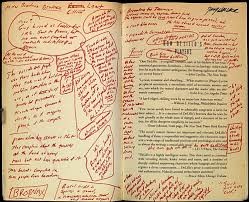Consent to Read
The influence of forceful reading on tomorrow’s literary works

Gettingsmart.com
Annotated text
If you went or go to a public school, you know about required reading. Published on a syllabus, you’re given a set amount of pages that you complete before you answer a couple questions on a worksheet. However, is this “required reading” the best way to learn?
It’s no secret that students aren’t huge fans of required reading. From classics like the Great Gatsby and Fahrenheit 451, to plays like Fences, high schoolers are especially familiar with these assignments. More often than not, though, students aren’t actually reading. Rather, they skim through the text, pick out a point or two that seems important, and answer the questions. I don’t think I’m the only one who would say that isn’t reading.
Reading is falling into a world. No matter the genre that you are reading, from fantasy to autobiographies, the author is tasked to create a marvelous world. They want to throw you into a moment, a relationship, and a mind. They want you to feel as the character feels, be in the moment that is being described. The reason these wondrous worlds last is because of this enrichment and engagement of the audience. Harry Potter and the Lord of the Rings are prime examples of this: massive and diverse worlds that are still written about today, that make the reader feel like they are part of that world.
Classics, such as Shakespeare’s plays and romantic stories like A Farewell to Arms or Jane Austen’s works, show engagement into relationships and force readers to root for the affairs in question.
Yet, when in discussions with students, you will seldom hear this. You aren’t blasted with a discussion of F. Scott Fitzgerald’s discussion of social constructs in the 20’s or blown away by a conversation surrounding Harper Lee’s beautiful imagery of small town Alabama.
In fact, when asking 10 people in the hallway about these books, unless they are currently reading or working on that book, it’s more likely they gawk in confusion.
In contrast, when you bring up a book that they are personally reading, these same faces light up. More often than not, they will be much more willing to launch into a discussion of a book from there choosing.
Many times, these conversations show that they are able to target the points that teachers ask them to analyze, such as rhetoric and figurative writing, by simply reading on their own and enjoying their reading experience.
Today, though, does personal reading carry the same weight it once did? The introduction of motion pictures, such as movies and TV shows, naturally, lessens the appeal of reading.
“I’d much rather allocate my time elsewhere than sit down and read for hours when I can get the gist of the story from watching the cinematic version, which is shorter while also receiving a form of entertainment,” said Arjun Gupta, a senior at South Windsor High School.
That, in itself, is fine and quite possibly unalterable. At the end of the day, in a world where you can watch a 10 minute review of a 300 page book, or watch beautiful action sequences instead of flipping through pages upon pages of words, the decision for many teens is already pre decided.
Despite that, though, reading must still hold a place in today’s world. I sat down with an English teacher here at South Windsor High School, Amanda Flaschbart, and discussed the matter. The AP Lang teacher agreed with me overall, making the point, “Students sometimes dread (required) reading because of its dragged out nature.”
We both also discussed giving students more options, to which she said, “Although it may be important to focus on one text sometimes, it isn’t required for every unit.” So the question remains, how do you strike a balance between making students read, while also allowing them to personally engage in the worlds that have been created? The best solution seems to be options given to students.
A freshman at the University of Nebraska, Gupil Kodali said while discussing the topic, “it’s a lot of work with essays but like if everyone reads the same book even the teacher gets bored of reading them.” Unfortunately, the world we live in and resources we are afforded means it is near impossible to get students to fully read and understand, unless we change the way we analyze.
Instead of forcing one book to be read, breaking it into multiple options. This doesn’t necessarily mean there should be book groups for every reading assignment, but giving students the option gives them more power. Take a few different books that are structured similarly, from the same time period, sharing any other features that you are looking for.
Instead of forcing students to read Ray Bradbury’s Fahrenheit 451 in a study surrounding a dystopian and censored future, bring in other books similar to it such as George Orwell’s 1984. Then, a change should also be made in the way that assignments are working. By setting page number limits and discussions surrounding it, not only are you forcing quicker readers on crutches, but when students get behind it gives them less motivation to continue.
I propose making it so you split in larger chunks. In a more collegiate way, hand them a book and give them a couple of weeks, possibly with the help of guided notes. Then, return to discussing that part of the books, narrowing the focus onto things such as rhetoric. There is no discussion of specific plot points. This, hopefully, adds incentive to read rather than watching a movie, as it focuses on the use of language specifically to create the world. “This idea may provide a productive alternative, especially for students who prefer to be more engaged in class and discussion,” said a Junior at South Windsor High School. It also allows readers the amount of time to read and digest the book that they need to. While it may slow down class slightly, if structured correctly time isn’t lost, and it may open the door for a greater number of students not only participating but also understanding what they are reading.
At the end of the day, the goal for teachers is to get as many students as possible to read and enjoy, while also learning the intricacies of the English language. There is no perfect fix when it comes to the teaching of readings. Just as in math and science, work must get done and things need to be taught.
Unlike other subjects, though, English is a very subjective subject. There is not one answer to a question many times, and to reflect the teaching methods should be subjective and fluid as well.
Yet if it is structured well, we can nurture the next Charles Dickens, Edgar Allen Poe, Sophocles, or something totally different and new for the next generation to read.

Aasrith Veerapaneni is a senior at South Windsor High School, and the Content Editor for The Bobcat Prowl this year. When not working with the Prowl, he has his fingerprints all over the Music department,...






